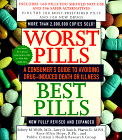Worst Pills Best Pills
encontrar mi
Authors: Sidney M. Wolfe, MD, Larry D. Sasich, Pharm.D., MPH, Rose-Ellen Hope, R.Ph., and Public Citizen's Health Research Group OncoLink Rating: |
Recent studies have shown that medical mistakes cause a significant number of deaths and injuries each year. Many of these mistakes are related to medication interactions and adverse drug reactions. Patients must take charge of their medical care and familiarize themselves with all medications they are taking. They need to ask their physicians about the medications being prescribed and be prepared to recognize possible adverse effects.
Worst Pills Best Pills was written to empower health care consumers. The authors state "this book is intended to help you and your family to improve your health by using drugs, if necessary, more carefully and recognizing those you should avoid." The book reviews 465 of the most commonly prescribed medications. Each drug listing contains background information and the mechanism of action, things to discuss with your doctor before taking the drug, utilization instructions, interactions with other medications, adverse effects, periodic tests required while taking the drug, and specific warnings about the drug. At the top of each listing the drug is rated as either "limited use" or "do not use." There is an index with drugs listed by both generic and brand name for easy reference. The book also includes a chapter of detailed strategies to help the reader use medications more safely. Worksheets to keep track of all medications and adverse reactions are also included. There is even a chapter that discusses common medical problems that may actually be caused by the medications you are taking.
Some health care providers may take exception with some of the drugs listed in the "Do Not Use" category. Clearly, every individual is different and there may be clinical circumstances that require the use of some of these medications. The book openly states that the reader should "talk to your doctor before deciding to make any changes in your prescription drugs based on the information in this book."
The book unmistakably leans towards the safe side and recommends using medications only when absolutely necessary. It also only advocates using those medications with the safest side effect profile and least interactions over any other medications in the same class. This book does not address the important interactions of herbal medicines and other unconventional medical therapies with prescription medications. Please visit the OncoLink Complementary Treatments Menu for more information on this subject.


